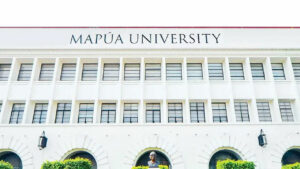




January Economic Update: Growth slows, prices rise
 DOWNLOAD
DOWNLOAD

Inflation Update: Up, up, and away?
 DOWNLOAD
DOWNLOAD

Quarterly Economic Growth Release: Growth takes on a slower pace
 DOWNLOAD
DOWNLOAD


English skills give Filipino business students edge in Asia

Filipino business students have an edge compared to those from other Asian countries owing to their English skills, which give them different opportunities, an industry expert said.
“One strength that Filipino students have is the command of the [English] language. That is a very important advantage if you’re moving to internationalization,” Mapúa University Enrique T. Yuchengco School of Business (ETYSB) Dean Jagdeep S. Jassel said in an online interview last week.
“There are some countries where the students want to be globally exposed, but their main hindrance or handicap is always the language… Filipino students speak very good English. They’re able to understand. They’re able to articulate, I think that… opens the door to many different opportunities,” he added.
Mr. Jassel comes from Malaysia and has taught in other countries such as India, Japan, China, and Taiwan.
Based on his experience, Filipino business students are very eager to learn as they want to prove themselves, he said.
“It’s best to give your attention to such kinds of characteristics: people who are looking for an opportunity so that they can prove themselves, rather than force feed,” Mr. Jassel said.
He said they want the market to see that Mapúa University is “beyond engineering and architecture” and has a lot to offer, especially with the ongoing collaboration between ETYSB and Arizona State University (ASU).
“This partnership, it’s not just an ordinary MOU (memorandum of understanding)… This is a very concerted effort — a very thoughtful, process-driven kind of partnership,” he said.
The collaboration, which began two years ago, is aimed towards developing students through global immersion, exposure to real work experience, and digital mastery.
“Two years ago, it was more of a planting in a particular relationship. So, to speak, we were getting to know each other, we were understanding better, we looked into structures. But the first intake of students who came in is this year,” Mr. Jassel said.
The business school has been able to develop five new programs for its about 300 students. The institution has access to ASU’s repository of curricula, academic exchange either in person or virtually, and industry exposure.
“Their (ASU) benefit is to have access to this part of the [Asian] market and also to liberalize education — to provide opportunity for any Filipino student who would want to go to the US and eventually even work there or even leave the country,” Mr. Jassel said.
As part of the partnership, ETYSB is also in contact with institutions in ASU’s network, such as Esa Unggul University in Indonesia and Sunway University in Malaysia.
“There are about 20 universities within this network of partnership now. So, we are actually leveraging the strength of network,” Mr. Jassel said.
“I would say one of the edges that Mapúa business students will have is that they will be able to hit the road running when they join any organization,” he added. — Sheldeen Joy Talavera
This article originally appeared on bworldonline.com





 By BusinessWorld
By BusinessWorld